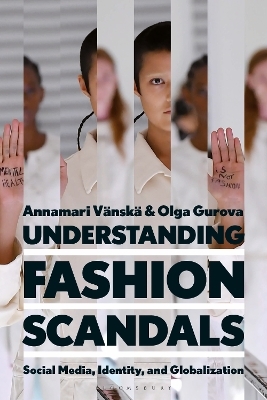
Understanding Fashion Scandals
Bloomsbury Visual Arts (Verlag)
978-1-350-24897-7 (ISBN)
Understanding Fashion Scandals is the first book to explore this changing landscape of contemporary fashion through case studies showing how ‘shock value’ lost its currency. The book focuses on the changes since the late-1970s and early 1980s, when brands like Calvin Klein and Benetton first used controversy as a promotional tool to build their brand identity, to the contemporary industry where avoiding social media backlash is critical to survival.
Analyzing the tactics brands including Burberry, Dior, Dolce & Gabbana and Prada adopt to avoid or mitigate scandals, Vänskä and Gurova map the fashion industry’s journey towards cultural sustainability.
Annamari Vänskä is Professor of Fashion Research at the Aalto University in Finland. She is the author of Fashionable Childhood (Bloomsbury, 2017) and the co-editor of Fashion Curating (Bloomsbury 2018). Vänskä’s work spans fashion as embodied culture and digitalization of fashion. She is currently the Deputy-PI of the consortium “Intimacy in Data-Driven Culture” and PI of the research project “Intimacy, Creative Work and Design,” funded by the Strategic Research Council at the Academy of Finland (2019-2025). Olga Gurova is a Senior Researcher in circular economy and consumer citizenship at Laurea University of Applied Sciences in Finland. She is the author of Soviet Underwear: Between Ideology and Everyday Life (2008) and Fashion and the Consumer Revolution in Contemporary Russia (2015). Gurova works on projects aimed at building an ecosystem of sustainable fashion through the enhancement of business models and consumer behavior in Finland and the Baltic countries, financed by Uudenmaan liitto and Interreg.
Introduction
The Two Types of Fashion Scandals
Scandal as Politicization of Fashion
Decolonizing Fashion
Positioning Ourselves
Epistemic Positionings
Structure of the Book
PART ONE THE FASHION SCANDAL—PAST AND PRESENT
1. Framing the Fashion Scandal: The Platformization of Fashion
Visualization of Fashion
Mediatization of Fashion
Social Media and the Platformization of Fashion
The Instagramification of Fashion
2. Fashion Brands Negotiating Identity Politics
Cultural Approach to Brands and Branding
Negotiating Identity Politics
3. Changing Strategies of Fashion Brands: From Shock to Scandal
A Short History of the Fashion Scandal: Deliberate Shock
Contemporary Shock: The Unintentional Scandal
Social Media and New Identity Politics
Dismantling White Privilege and Introducing Intersectionality to Fashion
4. Emotional Effects of Social Media on Fashion: Calling-out and Canceling
Emotional Branding
Emotional Reactions and Canceling
New Cultural Intermediaries and the Creation of the Unintentional Scandal
Consumers Empowered to Speak Up
What if a Brand is Canceled?
PART TWO CASE STUDIES
5. Russia
Love is (Not Just) Love
Feminist Resistance in a Conservative World
Race Across Time and Space
6. Finland
Maternity Clothes for 12-Year-Old African Girls
Flirting with Fascists
7. Global Scandals
Whose Identity? The Problem with “Cultural Appropriation”
Casual Racism: “Eating with Chopsticks”
Blackface and Structural Racism in the Fashion Industry
“Mental Health is not Fashion”
PART THREE THE RESPONSE TO FASHION SCANDALS
8. Just Don’t Do It!
Corporate World Response, Part One: Corporate Social Responsibility
Corporate World Response, Part Two: Brands as Political Actors
Corporate World Response, Part Three: Diversity Officers
Academic Response, Part One: The Danger of “Diversity Washing”
Academic Response, Part Two: the “Glossification of Diversity”
Academic Response, Part Three: Reimagining the Fashion Curriculum
Political Response, Part One: Supply Chains and Human Rights
Political Response, Part Two: Advocacy Groups Benchmarking
Business
Conclusion: A Call for Cultural and Social Sustainability
PART FOUR EPILOG
9. The Counter Narrative
Heidi Karjalainen, Finland
Ervin Latimer, Finland
Jahnkoy, USA
Claudia Lepik, Estonia
Muslin Brothers, Belgium
Kristian David, Sweden
Bibliography
Index
| Erscheinungsdatum | 13.01.2024 |
|---|---|
| Zusatzinfo | 23 bw illus |
| Verlagsort | London |
| Sprache | englisch |
| Maße | 156 x 234 mm |
| Themenwelt | Kunst / Musik / Theater ► Design / Innenarchitektur / Mode |
| Kunst / Musik / Theater ► Kunstgeschichte / Kunststile | |
| Technik | |
| Wirtschaft ► Betriebswirtschaft / Management ► Marketing / Vertrieb | |
| ISBN-10 | 1-350-24897-5 / 1350248975 |
| ISBN-13 | 978-1-350-24897-7 / 9781350248977 |
| Zustand | Neuware |
| Informationen gemäß Produktsicherheitsverordnung (GPSR) | |
| Haben Sie eine Frage zum Produkt? |
aus dem Bereich


